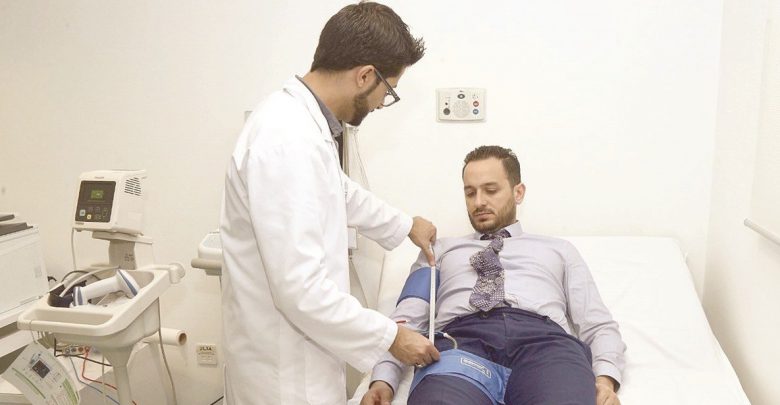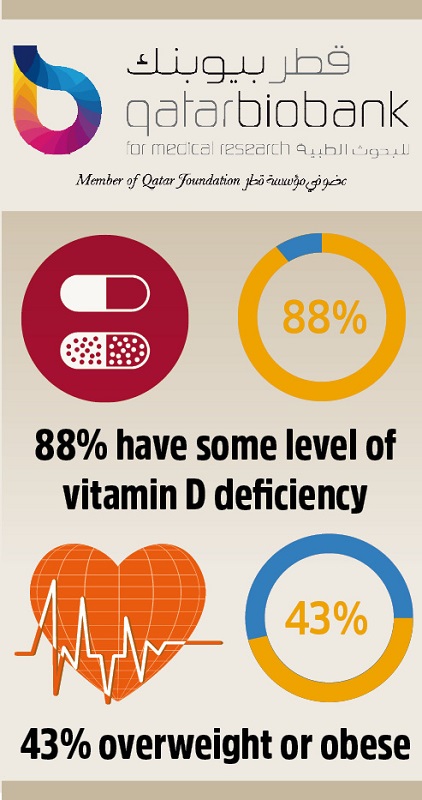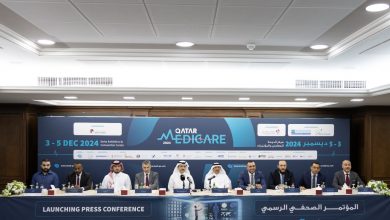
Qatar Biobank study finds high rate of obesity, Vitamin D deficiency
زيادة في معدلات البدانة ونقص فيتامين «د» لدى سكان الدولة
Doha: High prevalence of obesity and vitamin D deficiency has been found in Qatari population, according to Qatar Biobank report 2018/19 released yesterday. About 43 percent were found overweight or obese and 88 percent have some level of vitamin D deficiency.
The report was released on the sidelines of the International Biobanking Conference 2019 which started yesterday. It shows that Qatar continues to have some of the highest levels of metabolic disorders such as obesity and diabetics mellitus. It shows that 13.9 percent have diabetes and 17.7 percent fall into the prediabetes level and at the high risk of developing the condition.
The report provides a wide-ranging health profile and analysis of more than 18,000 Qataris and long-term residents who have participated in Qatar Biobank’s medical health research initiative. Qatar Biobank welcomes Qataris over the age of 18 and adult expatriates who have lived in Qatar for at least 15 years to take part in this pioneering medical research endeavour.
Among the participants in the ongoing study being conducted by Qatar Biobank, 38 percent reported having sedentary lifestyle habits and reported doing no physical exercise. Only 12 percent of participants have normal Vitamin D levels, while 25 percent have mild deficiency levels. Another 50 percent have a moderate deficiency level of Vitamin D, while 13 percent were found to have severe deficiency.
Some 49 percent participants of the study were women and 51 percent men, with a majority of them being in the age between 25 and 34.
“The report not only helps us better understand the health of the participants but also provides useful insights into the health of the entire population,” said Dr Nahla Afifi, Director of Qatar Biobank.
“The findings are empowering new research in Qatar, which will play an important role in early identification of health problems and take effective preventative measures. This, in essence, is the primary goal behind Qatar Biobank’s endeavour to collect information and samples from the population.
“The report is an important learning resource for everyone in Qatar, and can provide insights for members of the community on how to live healthier lives by slightly adjusting their lifestyles,” said Dr Afifi. The annual report also includes a detailed overview of the achievements of Qatar Biobank throughout 2018.
A second major study, which Qatar Biobank successfully developed in July 2018, is the Qatar Birth Cohort Study (QbiC). It is the first mother-child cohort study of its kind in the Middle East, and aims to assess the synergetic role of environmental exposure and genetic factors in the development of chronic disease. It monitors the health of women and children and obstetric characteristics with high prevalence.
“By generating a comprehensive picture of the environmental, genetic, and lifestyle factors that contribute to health issues facing the local population from the start of their lives, we can begin to help researchers and healthcare providers make better diagnoses and provide better treatments for diseases affecting the health of Qatar’s population,” said Dr Afifi.
By Fazeena Saleem | The Peninsula
نشر «قطر بيوبنك»، عضو مؤسسة قطر للتربية والعلوم وتنمية المجتمع، وجزء من قطاع البحوث والتطوير والابتكار في المؤسسة، اليوم، على هامش المؤتمر الدولي للبنوك الحيوية 2019، تقريره السنوي لعام 2018.
وتضمن هذا التقرير لمحة شاملة وتفصيلية عن إنجازات «قطر بيوبنك» خلال عام 2018، بالإضافة إلى تحليلات طبية شاملة لأكثر من 18000 مشارك، ممن قاموا بالمشاركة في المبادرة البحثية الطبية لـ «قطر بيوبنك».
كما يوضّح الصورة التي تدعو للقلق فيما يتعلق بالوضع الصحي للسكان في دولة قطر، من ضمنهم المواطنون الذين تزيد أعمارهم عن 18 عاماً، والمقيمون البالغون الذين يعيشون في البلاد منذ كثر من 15 عاماً.
وأفادت الدراسة التي أجراها «قطر بيوبنك» بأن 38 % من المشاركين لا يقومون بأي نوع من أنواع النشاط البدني على الإطلاق، وتم تسجيل 43 % من المشاركين على أنهم يعانون من زيادة الوزن أو السمنة المفرطة.
كما يظهر التقرير أن 12 % فقط من المشاركين في المبادرة لديهم معدل طبيعي من فيتامين «د»، بينما 25 % منهم لديهم معدلات نقص معتدلة، و50 % من المشاركين لديهم معدلات نقص متوسطة في فيتامين «د»، في مقابل 13 % لديهم معدلات نقص شديد في فيتامين «د». ويرتبط نقص فيتامين «د» بالعديد من الأمراض المزمنة، كالسكري، والسرطان، وأمراض القلب والأوعية الدموية، والالتهابات.
وتظهر البيانات الديموغرافية التي تم الحصول عليها بعد عملية التسجيل، أن أعداد المشاركين من الرجال والنساء كانت متقاربة جداً، (49 % مشاركين من الرجال، و51 % من النساء)، وكانت نسبة التسجيل الأكبر من المشاركين في الفئة العمرية من 25-34 عاماً.
وقالت الدكتورة نهلة عفيفي، مديرة «قطر بيوبنك»: «إن هذا التقرير يقدم رؤية مفيدة ومهمة حول صحة السكان، ويساعدنا على فهم الوضع الصحي للمشاركين بشكل أفضل، بالإضافة إلى أنه يعمل على تمكين الأبحاث الحديثة في قطر، التي ستلعب دوراً مهماً في الكشف المبكر عن المشاكل الصحية، واتخاذ الإجراءات والتدابير الوقائية الناجعة، وهذا في جوهره هو الهدف الأساسي من مساعي قطر بيوبنك لجمع المعلومات والعينات من السكان».
وأضافت الدكتورة عفيفي: «يعد هذا التقرير أيضاً مصدراً تعليماً مهماً للجميع في قطر، حيث إنه يحتوي على نصائح لأفراد المجتمع، كي ينعموا بحياة أفضل، وذلك من خلال اتباع نمط حياة صحي».
وفي يوليو 2018، قام «قطر بيوبنك» بتطوير ثاني دراسة معقدة وناجحة له، وهي مجموعة دراسة الولادة في قطر «QbiC». وتعد هذه الدراسة الأولى من نوعها في الشرق الأوسط التي تُعنى بالأم والطفل، وتهدف إلى تقييم الدور الذي يلعبه تآزر التعرض البيئي والعوامل الجينية في تطور الأمراض المزمنة، كما أن هذه الدراسة تراقب صحة الأم والطفل وخصائص التوليد على نطاق واسع.
وعلّقت الدكتورة عفيفي على ذلك بقولها: «إننا ومن خلال توليد صورة شاملة حول العوامل البيئية والوراثية والعوامل التي تشكل نمط الحياة الذي يسهم في المشكلات الصحية التي يواجهها السكان المحليون من بداية حياتهم. يمكننا أن نبدأ بمساعدة الباحثين ومقدمي الرعاية الصحية، على تشخيص الأمراض بشكل أفضل، وتقديم العلاجات الأنجع للأمراض التي تؤثر على الصحة السكانية في دولة قطر».




